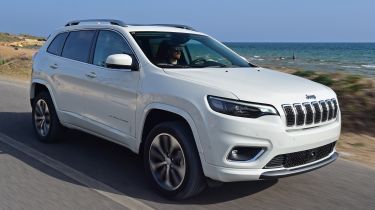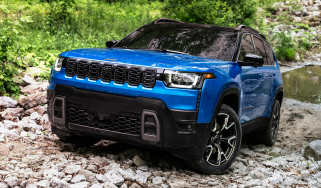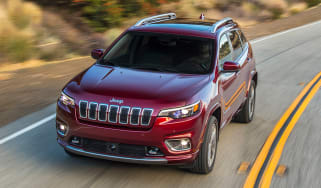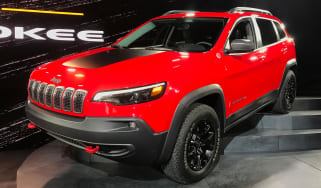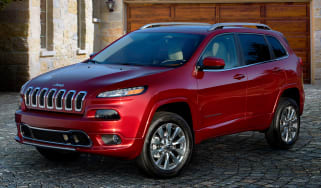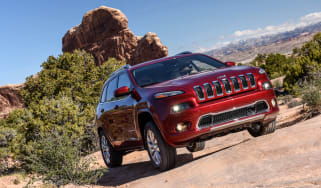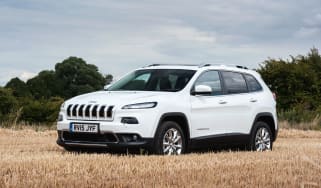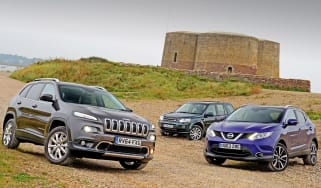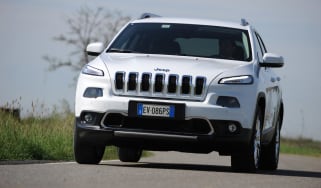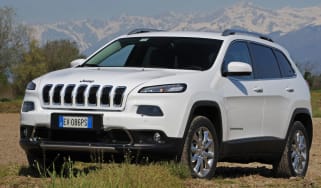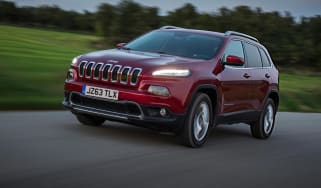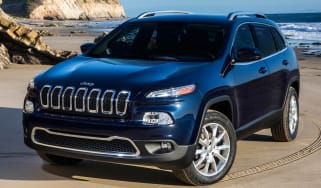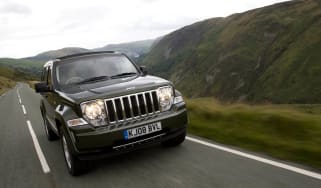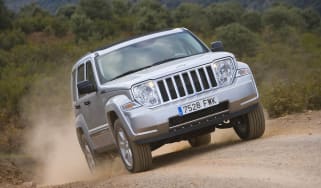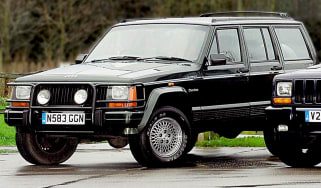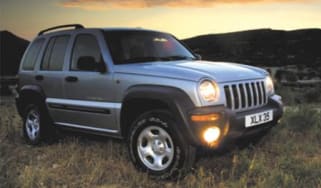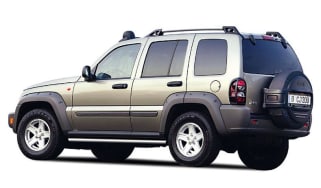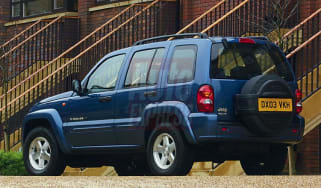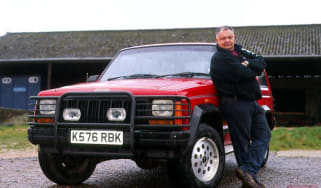Jeep Cherokee (2014-2019) review
The Jeep Cherokee is a good off-roader, but has an uphill struggle to make an impact in the SUV class

About the Jeep Cherokee
The Jeep Cherokee effectively sits in a class of its own. It’s built to rival models like the Nissan Qashqai and Volkswagen Tiguan, yet on price it actually competes with cars like the Audi Q5 and BMW X3. As a standalone product the Jeep is fine, but it’s difficult to recommend against such strong challengers.
The 2.2-litre diesel engine is an eager performer, especially when fited with the smooth-shifting 9-speed auto, while the clever 4x4 system means you can have genuine off-road ability that doesn't mean you have to sacrifice good fuel economy. Avoid the top-spec models, though, as they're rather pricey and Limited trim has all the goodies any buyer could possibly need.
The Jeep Cherokee established itself in the 1990s, when the XJ model was first for sale in right-hand-drive form. That version of the Cherokee has gone on to become a cult classic, but the current Cherokee is a far cry from its predecessor. While it used to be a model that delivered rugged appeal with a smattering of luxury further up the range, the current fifth-generation Cherokee is more like a crossover.
However, it's a pretty expensive one, with prices that place it alongside premium models such as the Land Rover Discovery Sport, Audi Q3 and Jaguar F-Pace. However, the Jeep can't match these cars for quality, and it's more of a rival for top-spec versions of cars like the Mazda CX-5, Ford Edge and Volkswagen Tiguan.
Used - available now

2015 Jeep
Grand Cherokee
48,025 milesAutomaticDiesel3.0L
Cash £16,895One thing that helps the Cherokee to stand out is its looks. With its stylised seven-slot grille, slender headlamps and additional air intakes, the front end of the Cherokee certainly was controversial when it arrived in 2014. However, an update for 2019 has brought in larger headlights similar in style to the Grand Cherokee and tidied up the front end considerably. The rear was also modified, with the number plate relocated from the bumper to the tailgate and new rear lights added, although the end result is a rather generic look from the back.
Under the skin, the Cherokee is based on a platform that can trace its roots to the Alfa Romeo Giulia, a result of the two companies being part of the FCA Group of Fiat and Chrysler brands. You might think that these Italian roots would inject a bit of dynamism to the way the Cherokee drives, but it doesn't. The Jeep is a relaxing car to drive, but it doesn't have the dynamic edge that some of its rivals offer.
Power comes from a single 2.2-litre diesel in two power outputs - there's no more V6 petrol available. The Multijet diesel comes in 148bhp and 192bhp forms, with the latter model coming with Jeep's smooth shifting nine-speed auto. This model is also four-wheel drive, but features Jeep's trick rear axle disconnect system that automatically operates in 2WD mode when the 4x4 system isn't needed. Also included is Selec-Terrain, which sets up the transmission and throttle response to suit different conditions, while Active Drive I and II offer improved off-road ability. If you don't need 4WD, there is a front-wheel-drive model offered, too.
Trims comprise Limited and Overland, both of which are very well equipped, but currently there is no dedicated Trailhawk off-road special in the line-up.
Engines, performance and drive
It only takes a few minutes perched behind the wheel of the Cherokee to realise this is a car aimed primarily at being as comfortable as possible.
Jeep has made big boasts about this car moving away from agricultural handling to more car-like road manners, but it has focused so heavily on a smooth ride that can handle the worst British tarmac that the drive is rather inert and disappointing. There’s lots of body roll and extremely light steering even at higher A-road speeds.
The 2.2-litre diesel adds weight over the nose, but as a result the Cherokee is rather wallowy in the corners. The steering doesn’t let you know what the front wheels are up to, though four-wheel drive models do get plenty of grip.
The Nissan Qashqai and Ford Kuga strike a better balance between family-friendly ride quality and a modicum of composure in faster driving. If your budget allows, though, the BMW X3 is this segment’s class leader.
Special praise must go to the Cherokee’s nine-speed automatic gearbox, which is optional on the lower powered diesel and standard with the bigger one. We’re often wary of gearboxes with eight or nine speeds as they can change gear too often in the name of meagre fuel consumption improvements.
But not only is the Jeep’s gearbox smoother than Land Rover's nine-speeder, it also contributes to a claimed 16% improvement in efficiency versus the old Cherokee.
It makes it a great motorway cruiser, and mated to the soft suspension ensures it is very easy to drive long distances. Refinement is pretty good, too, though the diesel engines are a little rattly at idle. It’s just a shame Jeep doesn’t offer any steering wheel-mounted paddles.
Engines
Engines ranged from a basic 138bhp diesel to a stonking 3.2-litre V6 petrol for the Cherokee at launch. But the 2018 update sees them dropped with just a 2.2-litre diesel in 150hp or 195hp guises offered. These two offer the best compromise of performance versus running costs, so it's no great loss to see the other engines disappear.
The entry-level diesel is available with a choice of front or four-wheel drive, while the more powerful one is 4x4 only, but with Jeep's clever rear axle disconnect system that boosts fuel efficiency. There's plenty of torque, but the 2.2 doesn’t feel quite as smooth or quick as a BMW X3 xDrive20d, and is significantly off the pace compared to higher-power (but similarly priced) rivals. It’s by far the pick of the range though, and the one we’d recommend if you’ve got your heart set on a Cherokee.
None of the diesels are particularly refined around town, but out on the open road they settle down into a quiet thrum. Plant the throttle though and the gruff clatter sparks back up – encouraging gentle progress on longer journeys.
MPG, CO2 and Running Costs
The thirsty V6 petrol Cherokee is no more, largely because it was a niche choice - 86 per cent of British customers have so far chosen diesel instead. The Cherokee’s 2.2-litre diesel engines make a case for erasing Jeep’s gas-guzzler reputation.
Fuel consumption for the updated car has yet to be determined, but the older model delivered claimed consumption of between 48.7mpg and 53.3mpg. This is on the old NEDC test cycle, but is around par for the class. The lighter, less friction-prone front-wheel drive model is the one to go for if running costs are the main worry. That car will also have the lowest CO2 emissions of any Cherokee.
Insurance groups
Insurance groups for the pre-facelift Jeep Cherokee ranged from 26 to 29, which is about average for the mid-sized SUV class. Cheaper models like the Ford Kuga cost less in annual premiums, with groups ranging from 18 to 23 – but models like the BMW X3 will be considerably more. A top-spec BMW sits in group 43, due it is powerful 3.0-litre diesel engine and flash image.
Depreciation
Depreciation for the pre-facelift Cherokee is fairly consistent across the range, with all models (excluding the range-topping Trailhawk V6) posting residual values of around 30 per cent. Some of the lower-powered diesels manage to retain 35 per cent of their value, but the most expensive 197bhp Limited spec cars hover around 29-31 per cent.
Expect that to compare with the likes of Audi’s Q5 and you’ll be sorely disappointed. Often touted as one of the industry’s depreciation busters, all Q5s – including the high-power SQ5 – will be worth more than 50% of their original value after three years. A BMW X3 is very nearly as impressive, with all models retaining between 49% and 52%.
To get an accurate valuation on a specific model check out our free car valuation tool...
Interior, design and technology
You won’t confuse the Cherokee with anything else on the road. Jeep’s gone radical with the SUV’s looks, and while the trademark Jeep seven-bar grille is present, it’s been totally overhauled.
Rather than being upright, the bars are folded over the leading edge of the bonnet, but the 2018 facelift has seen the Nissan Juke-style headlights replaced by a more conventional look. There are now large LED headlamp clusters that take inspiration from the larger Grand Cherokee, and the cleaner front end design is a lot more appealing than before.
The rest of the Cherokee’s shape is standard compact SUV, with simple lines and a rakish tailgate. Squared-off wheelarches add a chunky touch, and roof rails are standard. The front window sills are curved awkwardly, though, but at least the revised tailgate looks less like a vast expanse of metal now that the number plate has moved from the bumper to between the lights. However, it does now look rather generic, with a hint of the old Lexus RX 450h about the rear end.
Inside, the Cherokee makes a good first impression, thanks to the crystal clear TFT screens used for the touchscreen and trip computer. This is offset by some frustrating touches, though.
The infotainment and climate controls are mixed up on the centre console, while most other functions are controlled via the touchscreen menus. The rev counter features a huge hatched area to signify the red line – it’s not really needed as you’ll get nowhere near this ‘danger zone’ in normal driving.
Sat-nav, stereo and infotainment
Standard on Limited models is an 8.4-inch touchscreen display. It’s a colourful, crisp and intuitive system that could shame a few premium car makers’ interfaces, and works well with the optional seven-inch TFT display in the instrument binnacle.
The sat-nav and stereo system are all easy enough to use, it’s just a shame that Jeep chose to install such a cheap-looking Garmin unit. All cars come with Bluetooth for music streaming and hands-free calls, while top-spec models even feature a wireless charging pad on the centre console for compatible mobile phones.
Practicality, comfort and boot space
The Cherokee is only available in one body style, and unlike some rivals, doesn’t come with the option of seven seats. That said, it’s a spacious mid-sized SUV with a 591-litre boot that expands to 714 litres if you slide the rear seats forward. This obviously minimises legroom, but flip-over panels cover the gap between the boot floor and the seatbacks.
Whichever setting you choose, the load cover droops at the tailgate end, which can leave items exposed or reflecting in the rear window. You also get a removable metal bracket on one side of the boot, which features a set of handy bag hooks.
In the backs seats you get air vents and a 12v socket. Up front, storage is reasonable, with an armrest cubby, deep door bins and a handy iPod slot on the centre console, but the glovebox is small and the shallow dashtop cubby seems a bit pointless.
Dimensions and size
The Jeep Cherokee doesn’t feel much bigger or smaller than any of its main rivals. It’s on a par size-wise with models like BMW’s X3 and the Audi Q5. It’s easy enough to drive and the raised ride-height gives a commanding view of the road.
Leg room, head room & passenger space
Given the size of the Cherokee on the outside, it’s disappointingly cramped on the inside. Rear seat space is a little tight, despite the fact the bench can be slid backwards for more interior space.
Headroom is fine, though, and even taller adults shouldn’t find their hair brushing the roof. There’s a pair of ISOFIX mountings on each of the rear seats, which will prove handy if you have small children.
Having said all that, a Land Rover Discovery Sport is a better all-round package in terms of practicality– especially when you consider it’s available with two seats in the boot.
Boot space
Boot space in the Jeep Cherokee is good, if a little off the class best. At 591 litres, it’s considerably bigger than family cars like a Ford Mondeo (541 litres) or Vauxhall Insignia (530 litres), and main rivals like the BMW X3 (550 litres) and Audi Q5 (530 litres).
However, the 689-litre Land Rover Discovery Sport takes class honours here. Just remember that with seven on board, the Land Rover’s load space shrinks to just 194 litres.
Fold the Jeep’s rear seats flat and you’ll unveil 1,267 litres of load space – and you can even fold the front passenger seat for extra-long items. However, while that may sound big, the Disco Sport manages a cavernous 1,698 litres and is the car to go for if you regularly carry stuff to the tip.
Underfloor storage is available, but with just 77 litres on offer, it’s not exactly huge. There’s enough space to stash a few valuables though, or that box of eggs you want to preserve on a spirited drive back from the shops. All cars come with an electrically-operated tailgate, which is particularly handy when your hands are full.
Towing
Towing figures are yet to be confirmed for the updated Cherokee. The maximum braked trailer towing capacity of the old car changed dependent on engine and transmission. The maximum you could tow with any Cherokee was 2,200kg with the petrol 3.2-litre V6 automatic. However, drivers looking for something a little less meaty could go for the 138bhp 2.0-litre diesel or a 2.2-litre diesel available with 182bhp or 197bhp. Just remember that these engines will mean a 400kg reduction in towing power.
Reliability and Safety
The Jeep Cherokee uses a platform similar to the Alfa Romeo Giulietta, so many of the parts are proven in that car. The electronics are also shared with other Fiat Group models (not necessarily a good thing), while the sat-nav is from Garmin, and should be trouble-free.
Jeep's dealers have raised their game over the years. While they finished a lowly 26th out of 32 car companies in the 2015 Driver Power dealer survey, more recent years have seen the company get them into shape, with third and fifth place finishes in 2017 and 2018.
The Cherokee earned a five-star Euro NCAP crash test rating when it was launched in 2014, and has seven airbags, stability control and switchable four-wheel drive that can be tailored to suit off-road conditions. The updated Cherokee will feature even more safety kit.
Top-spec models come with a wealth of safety tech, including lane-departure warning assistance, blind-spot monitoring, and even a system that’ll automatically apply the handbrake when reversing if an obstacle appears behind the car.
Considering there’s also a clear reversing camera view displayed through an impressive 8.4-inch touchscreen, manoeuvring the Cherokee should be a doddle, despite its gaping turning circle.
Warranty
Like many new cars, the Jeep Cherokee benefits from a three-year, 60,000-mile warranty. Paintwork is guaranteed for just 24 months, while Jeep ensures your car will remain rust-free with its seven-year perforating rust warranty – standard on all new cars. All the Cherokee’s main rivals – aside from models like the Hyundai Santa Fe and Kia Sportage, come with similar three-year guarantees.
Servicing
Servicing intervals are 12,500 miles or 12 months, whichever comes sooner. But costs are hard to come by, as Jeep says each model requires a range of services and checks depending on your car’s mileage.
